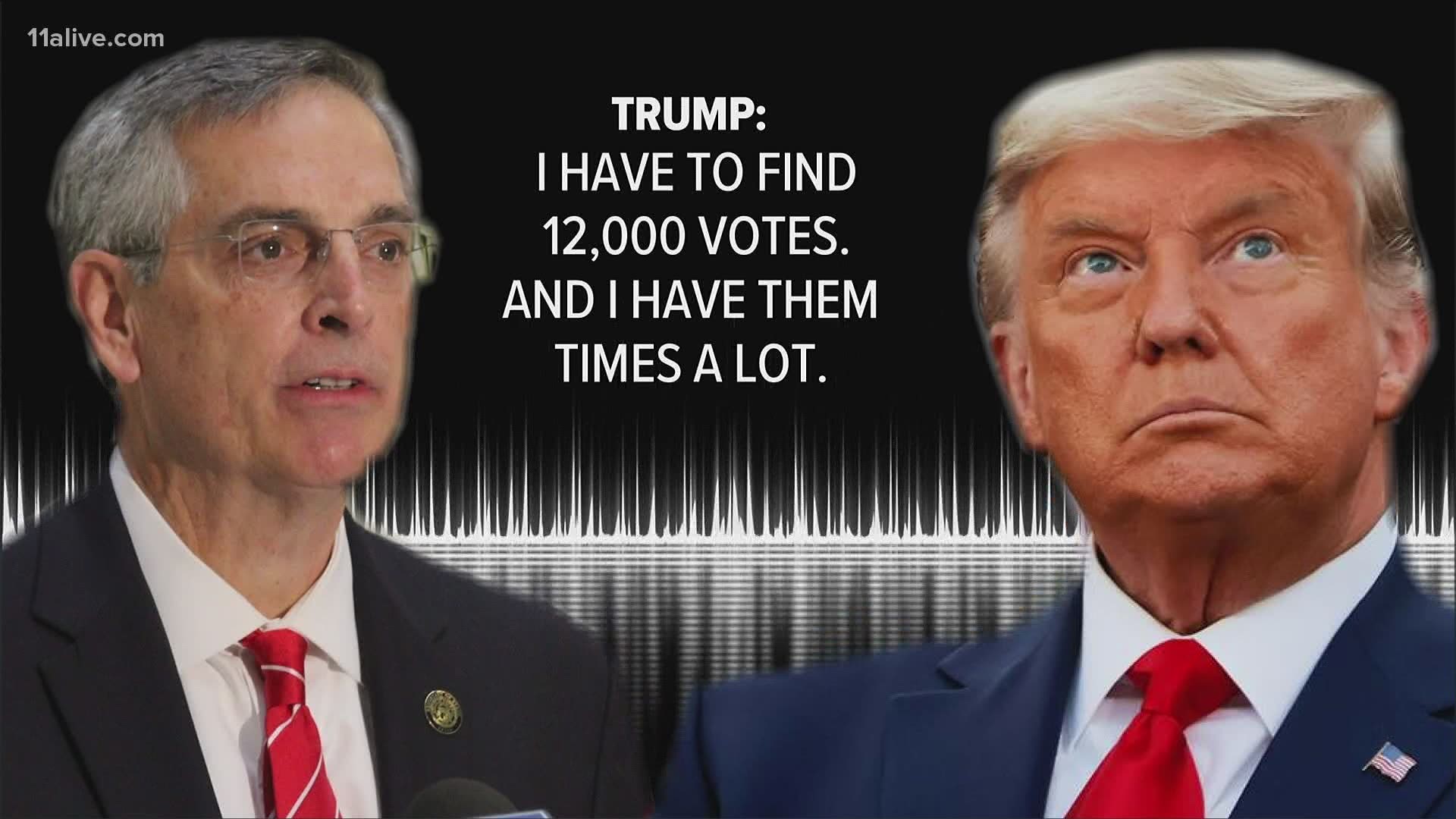ATLANTA — With at least one Georgia elections board member vowing to push for Trump to be tried by a local district attorney, questions have arisen about how such an unusual trial could play out.
On Monday, 11Alive spoke with a former federal prosecutor about what he thought of the possibility. Bret Williams owns BRW Law Group in Atlanta and is a former prosecutor for both the Southern District of New York and the Northern District of Georgia totaling 17 years.
And while he also worked previously in the voting section of the Department of Justice's Civil Rights Division, he said this potential trial would be unusual - even for him.
"In my ... understanding of history and research, it is unprecedented," he said. "I don't know, I can't think of another situation like this."
The case in question hasn't yet materialized, but new developments suggest it could.
The concerns surround an early January phone call between Georgia Secretary of State Brad Raffensperger and President Trump regarding the election. The recorded call was first reported by Washington Post, which released audio on Jan. 3. In the one-hour conversation, Trump is heard pressuring Raffensperger to "recalculate" the vote count because "I just want to find 11,780 votes."
Throughout the call, Raffensperger rejected pushes to do so, standing behind the final election count which was the result of the initial tally, a hand-audit and a recount requested by Trump's campaign.
Now, with attorney and member of the state board of elections, David Worley, suggesting he will make a motion to have the investigation passed to Fulton County District Fani Willis, there's a chance a U.S. president could be facing local charges for the call. Whether it happens would fall on whether a majority of the election board agrees with Worley and sends the case out for further investigation or prosecution.
But, even if they did, Williams said this would likely be neither a "slam dunk" nor an automatic acquittal.
"You can make arguments on both sides as to what the intent is," he said.
He said it would largely come down to whether Trump intended to have Raffesnperger find the votes in question or if the remark was somewhat of an off-handed comment.
"So, I don't think that it's a slam dunk one way or the other," he said. "And I think that you have heard people who speak as if it's just an obvious conviction or obvious acquittal. I don't think it's so obvious. And, when it comes to trials, I would say practically nothing is obvious."
When the news of the call between Trump and Raffensperger first broke, District Attorney Willis signaled that she was aware of the incident that that if it came her way, she would "enforce the law without fear or favor."
That said, Williams suggested such a trial would be a major undertaking for her office.
"I think one of the first questions is, can you eat an elephant? Are you prepared for - is your office of sufficient size? Do you have enough resources?" he asked. "Are you prepared to - to have a number of your employees enveloped in this such that you can't do other things?"
And, as an elected official, Williams said a district attorney would at least be aware that their reputation would be tied to such a big case.
"I would imagine, a DA is looking over his or her shoulder and thinking about the election, because they're creatures of an election and, to some extent, they're creatures of popularity," he said. "So, I don't think you'd want to do something that was wildly popular or do something that - that might get you fired."
One additional area of difficulty would likely be finding an impartial jury for such a well-known figure on the topic of a well-publicized phone call.
"Well [to] find an unbiased jury can be tough," Williams said. "You ask, can you be fair and impartial? They say yes. And they believe they can be and they are being as truthful as they can be."
But, he said, there are cases where a person's actions may not match up with their own beliefs of being impartial.
"People will tell you, they can be fair and they believe they can be. But then, oftentimes, you look at the conduct and that's not what you find," Williams said. "You don't - you don't find fairness."
Regardless of Trump's title or notoriety, Williams suggests the law should not look upon him any differently than anyone else facing the such accusations - suggesting there should not be different justice for different people.
"There's not a referendum on you as a person, on your entire life, on your behavior," he said. "The question is simply if you, or anyone else, whether you have committed this offense."
Meanwhile, the nation will also be keeping its eyes on another possible trial - this one by the Senate - following the president's recent impeachment.
And while the article of impeachment actually mentions the Raffensperger-Trump phone call, the proceedings at the federal and state levels would, nonetheless, unfold as completely separate cases.
"Whether or not there are charges filed at the state level in Georgia has nothing to do with federal charges being filed by anyone with the impeachment being prosecuted, by Congress, any of that," Williams said.

